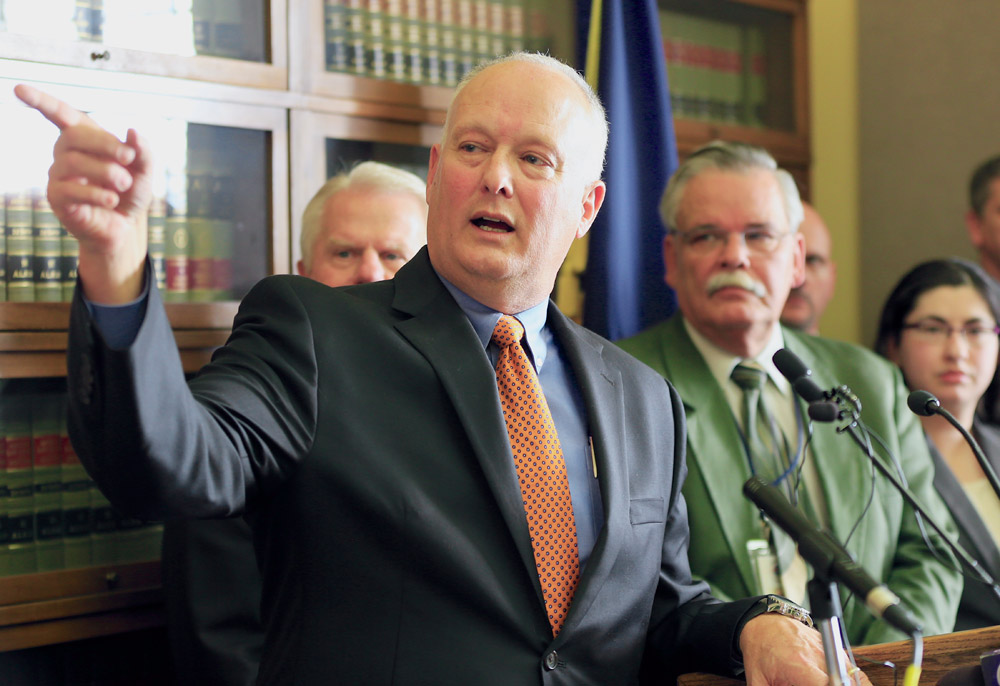On Jan. 27, Nebraska Attorney General Doug Peterson sent a column titled “Why sue Colorado?” to newspapers throughout the region. The column reads like an open letter — addressing Nebraska and Oklahoma’s petition to the U.S. Supreme Court to overrule the Colorado laws allowing legal pot sales.
The letter was sent to The Denver Post and The Cannabist. Here is the full text of Peterson’s column.
WHY SUE COLORADO?
By Doug Peterson
As Attorney General, I have had many people ask me why Nebraska is suing Colorado over its marijuana law. This is a question that requires thoughtful consideration because, left unchallenged, I am confident Colorado’s law will cause long-term harm to Nebraska families.
In 2012, Colorado voters legalized marijuana for recreational use. This recreational use law followed on the heels of prior passage of a medical marijuana use bill which very loosely enforced the concept of “medical”. In doing so, Colorado took a federally recognized Schedule I illegal drug, as defined by the Controlled Substances Act of 1970 and launched into what Colorado officials are finding is uncharted territory. Colorado’s own appointed Marijuana Czar, Andrew Freedmen, admitted, “I do worry about if we are irreparably harming Colorado. And it’s something that will take years to suss (grasp) out”. Additionally, just last week, Colorado’s Governor Hickenlooper confessed, “We don’t know what the unintended consequences are,” of legalizing marijuana.

It is not Nebraska’s position to stand idle and watch Colorado’s failed experiment as it spills over to our state. One of government’s primary purposes is to protect its citizens from known harm. There is no question that Colorado’s marijuana practices have and will continue to harm Nebraskans and thus it is incumbent upon Nebraska to take action.
A 2009 study published in The Lancet reported that one out of six adolescents aged 13-19 who try marijuana will become addicted. The number of addicted youth will likely increase due to the extremely dangerous THC levels in Colorado marijuana products, known to be the highest potency in the world. The method of use is also made more attractive for adolescents when delivered in such forms as gummy bears, power drinks, and candy bars. The addiction potential for adolescents is a significant risk according to the Federal Substance Abuse and Mental Health Services Administration.
An April 2014 neuroscience study, jointly produced by the medical schools of Northwestern University and Harvard University, concluded that, based upon high resolution MRI scans, young recreational users of marijuana, aged 18 to 21, did show noticeable structural abnormalities in regions of the brain that affect memory, attention, concentration and impulses. This is objective medical evidence of physical harm to the developing brain.
Colorado legalization lawsuit:
Special report from The Cannabist
Legalization hesitation: The pushback against pot by social conservatives, law enforcement
Document: Read the text of the lawsuit filed in U.S. Supreme Court
Follow The Cannabist on Twitter and Facebook
A June 2014 article, published in the New England Journal of Medicine reported that marijuana use in adolescents negatively impacted the functional connectivity of the brain creating a significant decline in IQ. Additionally, regular use of marijuana by young people is associated with increased risk for anxiety, depression and psychosis, including schizophrenia. This is especially true for young people who have a pre-existing genetic vulnerability, according to studies cited by the National Institute of Health. This mental health threat will only compound the burden upon Nebraska’s mental health system.
Colorado’s legalization of recreational use and the Department of Justice’s lack of enforcement of federal law has allowed for the rapid development of a multi-million dollar impairment industry. Those in this exploitative business seek to shift the public’s perception to believe marijuana is harmless, but at the same time the impairment industry is making its products increasingly more potent. Robert MacCoun, a behavioral scientist at U.C. Berkeley who has studied drug policy here and abroad, calls it an “arms race, in which growers strive to create the highest-octane varieties, and then bestow awards on themselves at the annual Cannabis Cup competition.”
Law enforcement statistics from the Nebraska State Patrol confirm that approximately twice as much marijuana is seized from Colorado as that trafficked from Mexico and California. The State and County law enforcement costs continue to rise.
Ideally, the citizens of Colorado would repeal this law, following the lead of five of its cities that have already voted to ban recreational use. Repeal in Colorado is made more difficult because commercial enterprise has been unleashed and tax revenue is now being generated. Some might call Colorado progressive for opening up the gates to the impairment industry. However, those who are not driven by profit or recreational escapism more wisely understand the real danger of this social experiment.
Nebraska has only one real choice, to uphold the law that exists for the protection of the public and the well-being of Nebraska’s families. We must not subject our youth to such a costly social experiment.
